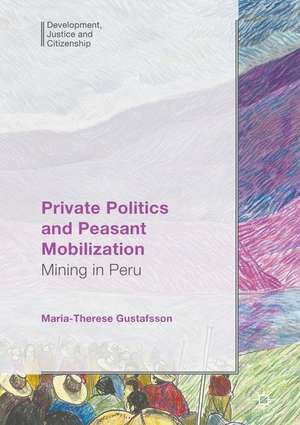Private Politics and Peasant Mobilization: Mining in Peru: Development, Justice and Citizenship
Autor Maria-Therese Gustafssonen Limba Engleză Hardback – 2 oct 2017
| Toate formatele și edițiile | Preț | Express |
|---|---|---|
| Paperback (1) | 577.29 lei 38-44 zile | |
| Springer International Publishing – 14 aug 2018 | 577.29 lei 38-44 zile | |
| Hardback (1) | 645.28 lei 6-8 săpt. | |
| Springer International Publishing – 2 oct 2017 | 645.28 lei 6-8 săpt. |
Preț: 645.28 lei
Preț vechi: 759.15 lei
-15% Nou
Puncte Express: 968
Preț estimativ în valută:
123.49€ • 128.45$ • 101.95£
123.49€ • 128.45$ • 101.95£
Carte tipărită la comandă
Livrare economică 15-29 aprilie
Preluare comenzi: 021 569.72.76
Specificații
ISBN-13: 9783319607559
ISBN-10: 3319607553
Pagini: 258
Ilustrații: XVI, 232 p. 3 illus. in color.
Dimensiuni: 148 x 210 mm
Greutate: 0.55 kg
Ediția:1st ed. 2018
Editura: Springer International Publishing
Colecția Palgrave Macmillan
Seria Development, Justice and Citizenship
Locul publicării:Cham, Switzerland
ISBN-10: 3319607553
Pagini: 258
Ilustrații: XVI, 232 p. 3 illus. in color.
Dimensiuni: 148 x 210 mm
Greutate: 0.55 kg
Ediția:1st ed. 2018
Editura: Springer International Publishing
Colecția Palgrave Macmillan
Seria Development, Justice and Citizenship
Locul publicării:Cham, Switzerland
Cuprins
Chapter 1: Introduction.- Chapter 2: Peasant Mobilization and the Expansion of Mining in Peru.- Chapter 3: Demands for Rights and Confrontations in the Rio Blanco-Project.- Chapter 4: Struggles to Open up new Political Spaces to Control Natural Resources.- Chapter 5: Demands for Services and Demobilization in the Bambas-Project.- Chapter 6: The Fragmented Struggle for Services.- Chapter 6: Conclusion.
Notă biografică
Maria-Therese Gustafsson is Research Fellow in the Department of Political Science at Stockholm University, Sweden. Her research foci include natural resource governance and political participation.
Textul de pe ultima copertă
“In this insightful book on relationships between multinational mining companies and local communities, Maria-Therese Gustafsson shines new light on local struggles to deepen democracy and redefine the terms of international corporate investment in the Peruvian Andes.”
—Kenneth Roberts, Cornell University, USA
“This book is a must-read for academics and students, as well as potential investors in natural resources, governmental officials and activists that seek to avoid not only the irruption of conflicts, but also the ongoing destruction of communities in Latin America and other resource-rich regions.”
—Benedicte Bull, University of Oslo, Norway
“By comparing two cases of resistance to the expansion of mining in Peru, the author convincingly points at the relations between communities’ organizational strengths, big corporations’ governance strategies and state institutions’ interventions.”
—Donatella della Porta, Scuola Normale Superiore di Pisa, Italy
This book explores how different corporate governance strategies affect community mobilization and the scope for influence when an area’s population is faced with the arrival of the extraction industry. Drawing on ethnographic research into Peruvian mining localities, the author analyses a series of relationships which are characterized by confrontations, clientelism, demobilization and strategic collaboration. By presenting a detailed account of micro practices and showing how these processes are interpreted by different groups, Gustafsson offers a refined understanding of the multiple layers and informal workings of power between transnational corporations and local communities.
—Kenneth Roberts, Cornell University, USA
“This book is a must-read for academics and students, as well as potential investors in natural resources, governmental officials and activists that seek to avoid not only the irruption of conflicts, but also the ongoing destruction of communities in Latin America and other resource-rich regions.”
—Benedicte Bull, University of Oslo, Norway
“By comparing two cases of resistance to the expansion of mining in Peru, the author convincingly points at the relations between communities’ organizational strengths, big corporations’ governance strategies and state institutions’ interventions.”
—Donatella della Porta, Scuola Normale Superiore di Pisa, Italy
This book explores how different corporate governance strategies affect community mobilization and the scope for influence when an area’s population is faced with the arrival of the extraction industry. Drawing on ethnographic research into Peruvian mining localities, the author analyses a series of relationships which are characterized by confrontations, clientelism, demobilization and strategic collaboration. By presenting a detailed account of micro practices and showing how these processes are interpreted by different groups, Gustafsson offers a refined understanding of the multiple layers and informal workings of power between transnational corporations and local communities.
Caracteristici
Broadens the empirical scope of existing literature by emphasizing the variety of corporate-community relations Addresses the growing debates on the political role of corporations in social movement research Draws on extensive empirical material, collected during six months of field research






